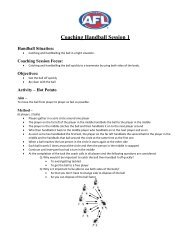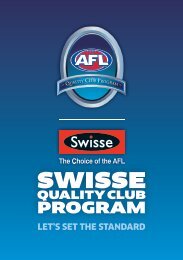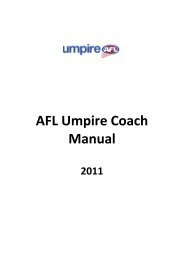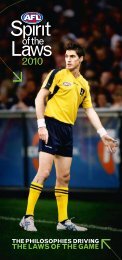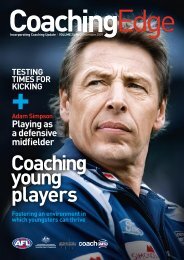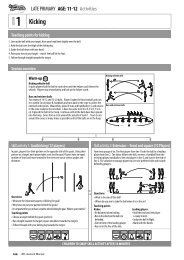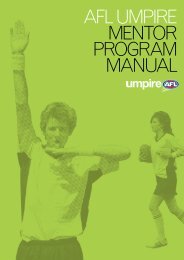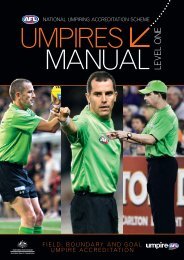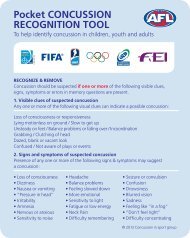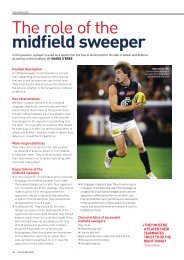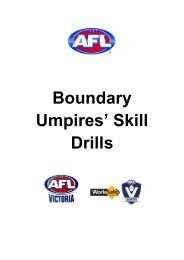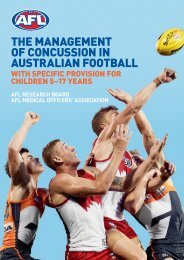Coaching Edge - AFL Community
Coaching Edge - AFL Community
Coaching Edge - AFL Community
You also want an ePaper? Increase the reach of your titles
YUMPU automatically turns print PDFs into web optimized ePapers that Google loves.
Just 15 minutes after the siren<br />
signaled the end of his 2012 home<br />
and away season, Sydney Swans<br />
skipper Jarrad McVeigh marshalled<br />
his teammates into the corner of<br />
the visitors’ rooms at Geelong’s<br />
Simonds Stadium for a quick chat.<br />
The Swans had just suffered their third loss in<br />
four games, and would finish third on the ladder.<br />
It meant the club would face Adelaide in a<br />
qualifying final on the road in the first week of<br />
the finals, having dropped from top spot in the<br />
final two games. To outsiders, Sydney’s<br />
campaign looked to be teetering.<br />
The players leaned in to hear McVeigh’s<br />
message. It was simple and direct.<br />
“He just reassured us that if we brought our<br />
A-game, played with each other and played<br />
the way we wanted to play, then we were a<br />
good side,” young midfielder Daniel<br />
Hannebery said.<br />
A similar message was repeated when<br />
coach John Longmire and McVeigh fronted the<br />
media moments later. The Swans’ form was<br />
reasonable; they had to improve their ball<br />
movement and felt, at their best, they could<br />
beat anyone. But their only focus from this<br />
point on would be beating the Crows.<br />
Many saw the post-match words as the<br />
necessary glass half-full approach to take<br />
at the time, yet in hindsight, the measured<br />
approach can be seen as an<br />
example of the Sydney<br />
process at work.<br />
Reflecting on his leaders’ capacity to<br />
refocus the group with some well-chosen<br />
words, Longmire said it was their capacity to<br />
act on what they said that characterised them<br />
as quality leaders.<br />
“‘Macca’ (McVeigh) and a large number of<br />
our senior players were able to do that at<br />
times when it mattered and importantly back<br />
it up with actions and not just words,” he said.<br />
“It’s one thing to be able to identify it and<br />
talk about it and it’s another to be able to<br />
actually deliver it and make sure you get your<br />
actions right.”<br />
A week later, the Swans were in a<br />
preliminary final after defeating the Crows by<br />
29 points. At the end of the month, Sydney<br />
was premier, having prevailed over Hawthorn<br />
in a classic Grand Final.<br />
How did the Swans achieve what few<br />
outsiders expected them to achieve at the<br />
start of the finals?<br />
“There’s no secret to it,” said Longmire, a<br />
premiership coach after just two seasons as<br />
the main man. “It’s just about trying to keep<br />
working hard. We’re not perfect.”<br />
The mindset that appears to be ingrained<br />
in the Swans is a willingness to do what needs<br />
to be done in order to get better.<br />
“We try to make sure that little things<br />
on-field and little things off-field are all<br />
picked up on as soon as we feel we’re<br />
drifting slightly,” premiership defender Ted<br />
Richards said.<br />
That’s easier, of course, to say than do.<br />
For the coach, it means having a philosophy<br />
to turn to under pressure. It means keeping the<br />
message simple and being clear about the key<br />
indicators that result in wins and losses.<br />
After the loss to the Cats, Sydney<br />
tweaked its ball movement methods slightly,<br />
re-introduced Nick Smith and Ben Reid into<br />
the team, gambled on Mitch Morton and went<br />
into the finals with everyone prepared to play<br />
their role.<br />
Knowing what is expected is a big part<br />
of the Swans’ consistent performances.<br />
The coach likes to remind himself that<br />
basic is best and he keeps breaking things<br />
down to ensure the players’ jobs are not<br />
overcomplicated.<br />
Along with hard work, it seems to be the<br />
reason why so many players who arrive at<br />
the club get better.<br />
Look at the premiership team: Richards,<br />
Martin Mattner, Rhyce Shaw, Morton, Shane<br />
Mumford and Josh Kennedy came to the<br />
Swans seeking more opportunities. Only<br />
Mumford was seen at the time as a big<br />
loss for his former club (Geelong), although<br />
all were considered by their clubs to be<br />
good characters.<br />
All are now admired for what they have<br />
achieved at Sydney.<br />
When Richards was asked if Sydney has<br />
some magical formula for transforming<br />
cast-offs, he responded without hesitation.<br />
“Quite the opposite. No one comes here<br />
thinking something magical is going to<br />
happen,” he said.<br />
“Everyone who has come here from another<br />
club really appreciates the second chance and<br />
knows there may not be a third.<br />
“Everyone who comes from another club<br />
has come here with a great attitude, willing to<br />
work hard and willing to buy into the culture<br />
and earn the respect of their teammates.”<br />
The hard-working, team-first philosophy<br />
has been drummed into the players over many<br />
years, at least since Paul Roos, Stuart Maxfield<br />
and Leading Teams began to drive a cultural<br />
renaissance at the club.<br />
Each player is given a role to play and is<br />
expected to perform it: nothing more;<br />
nothing less.<br />
That’s why a player such as Canadian Mike<br />
Pyke, a football novice, can develop into a<br />
valuable player.<br />
Even though Pyke had the competitive<br />
nature and the capacity to pick up new<br />
concepts, he also had coaches who recognised<br />
his limitations.<br />
That wasn’t easy. It required a change in<br />
instincts from all parties.<br />
One day at training, Longmire told Pyke<br />
after an errant kick to stop thinking he was<br />
Darren Jarman, the brilliant former Hawk and<br />
Crow. Longmire soon realised the name<br />
Jarman, let alone his kicking ability, was not<br />
familiar to Pyke.<br />
So the coaches found other ways to<br />
communicate to Pyke and eventually he<br />
starred in a premiership win.<br />
The players also have a communication<br />
system among themselves and the rest of<br />
the club that focuses on certain standards<br />
and expectations.<br />
Morton revealed it was a mid-season chat<br />
with a senior player that turned his career<br />
around in 2012, and led to him performing the<br />
role he was expected to play when he kicked<br />
two goals in the Grand Final.<br />
The mystery for other clubs is how the<br />
Swans have managed to keep the culture<br />
alive through generations.<br />
Since the seminal period when Maxfield<br />
was captain, Barry Hall, Brett Kirk, Leo Barry,<br />
Craig Bolton, Adam Goodes, McVeigh, and<br />
now, Kieren Jack, have led the club. »<br />
‘<br />
It’s just<br />
about<br />
trying<br />
to keep<br />
working<br />
hard<br />
’<br />
COACH John longmire<br />
COACHING EDGE / JUNE JULY 2013 // 7



